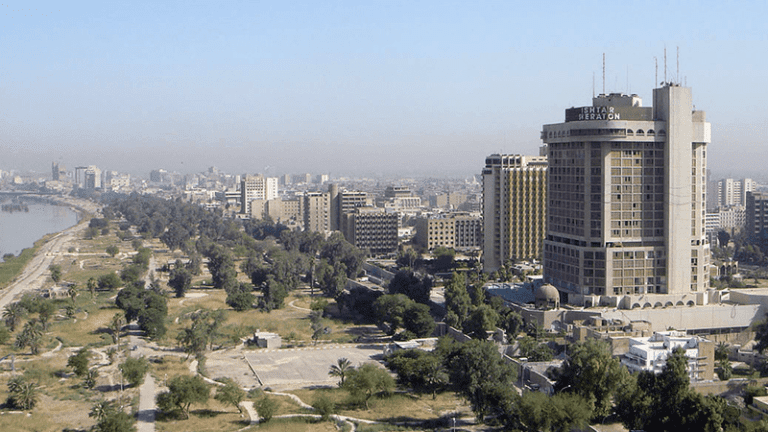
Historical Background
Iraq and the Gulf Cooperation Council (GCC) have a long history of cooperation as well as enmity. Their history dates back to the early twentieth century when relations were tense and strained between Iraq and the Saudi Sultanate of Najd, and subsequently, the Sultanate of Najd and Hijaz after the toppling of the Hashemite Kingdom of Hijaz in 1925.
By 1922, an agreement called the Uqair Protocol was reached between the two entities under the patronage of Sir Percy Cox, the British High Commissioner to Iraq, and signed by their representatives. Kuwait was also part of these border discussions. After the failure of the parties to agree on borders, however, Sir Percy Cox drew a line in the sand projecting the borders between the three countries; but his decisions satisfied none of them. This was the root of the ensuing problems between Iraq and Kuwait, holding many consequences for the two countries for decades to come.
History also shows that relations were not always strained in the Gulf region; in fact, there was a long period of practical and stable collaboration between Iraq and Saudi Arabia. Relations between Iraq and Kuwait were strained most of the time, however, though there was a positive and constructive period during the Iraq-Iran War (1980-1988). Whether cordial relations among GCC countries were prompted by the Iraq-Iran War or by the conviction that the parties shared the same interests, it is clear that those years were characterized by friendliness. However, relations started to worsen the moment the war ended.
Iraq and the GCC
The GCC, a regional organization of cooperation established in 1981 during the Abu Dhabi summit after the Iraq-Iran War had begun, was intended to safeguard member states from the consequences of the war on the Arab Gulf states. The alliance was shaped initially as a political and economic entity; later, it advanced to address the security problems faced by the alliance and its states.
This security alliance demonstrated its viability during the Kuwait crisis of 1990-1991, when all the Gulf states allied with the international coalition led by the United States to regain and liberate Kuwait. This was when enmity started between Iraq under Saddam Hussein and the rest of the Gulf states. Iraq saw the GCC countries’ stance as facilitating the “aggression” of the United States in Operation Desert Storm. Many Iraqis perceive the current situation in Iraq as a direct result of the 2003 invasion by the US-led coalition that included the GCC countries.
After the invasion and the following splits in Iraqi society on ethnic and sectarian lines, the GCC countries, particularly Saudi Arabia and Qatar, were accused by the Iraqi Shi’is of supporting terrorism (Al-Qaeda in Iraq, and subsequently ISIL). For their part, the Iraqi Arab Sunnis accused the Iraqi Arab Shi’is of being Iranian puppets and furthering the Iranian agenda in Iraq and the Levant. Relations deteriorated despite the efforts of GCC countries to reconcile with Iraq to pull it away from the Iranian orbit. Qatar, Saudi Arabia, and the UAE tried hard to convince the Iraqi government that the GCC countries were willing to help, that there was no link between the terrorist groups and the working agenda of the GCC countries, and that any citizens from GCC countries who were caught collaborating with ISIL were behaving according to their own convictions rather than being encouraged by their governments. Saudi Arabia nominated an ambassador to Baghdad and he did his best to advance bilateral relations; however, he was targeted by what the GCC countries perceived as Iranian-supported militias and was forced to leave Iraq. This reflected negatively on bilateral relations—a good chance to enhance relations was ruined.
The GCC countries also accused the Iraqi government of meddling in Bahraini affairs, and the Iraqi Shi’i militias of threatening to intervene in support of the Bahraini Shi’i opposition. The same militias threatened to avenge the execution of a Saudi member of the Shi’i clergy, Sheikh Nimr al-Nimr. There was no real reason that made the Iraqi Shi’i militias—supported by Iran’s Revolutionary Guard—to abduct scores of Qatari nationals who had entered Iraq under a tourist visa to spend some time in the southwestern desert, which was their preferred hunting ground. The abductors asked for a huge ransom, which Qatar handed over to the Iraqi government in return for the freedom of its citizens. This issue became one of accusations against Qatar—that it supported Iranian militias in Iraq. It was refuted by Iraqi Prime Minister Haider Al-Abadi, who declared that not a dollar was touched by any party and that the money was entrusted to the Central Bank of Iraq pending procedures that called for the presence and approval of the Qatari government.
The Current Crisis with Qatar
The recent Gulf crisis resulted in renewed turmoil in the region. Although Iraq is not one of the parties in conflict, it provides land and sea continuity for the GCC land mass. In the past, this facilitated the infiltration of ISIL adherents into Iraq, and the establishment of a military presence by Iranian-backed militias at the Iraqi-Saudi and the Iraqi-Kuwaiti borders. The most strategic physical location was al-Nukhaib—a strategic link in the desert between Iraq and both the Najd, the heartland of Wahhabism, and the Hejaz, where the two holy places of Mecca and Medina are situated. The militias vowed that they would someday “liberate” the two shrines from the Saudis. The rift within the GCC has encouraged this threat and may bring some of the GCC parties closer to Iran.
Prime Minister Abadi expressed his disagreement with the blockade against Qatar both in Baghdad and in Riyadh, where, in June 2017, he was received by Saudi Arabia’s King Salman with hospitability and respect, after which he flew to Tehran, where he listened to critical advice and warnings from Ayatollah Ali Khameini. In fact, Iraq now finds itself engulfed by three sources of pressure fueled by the present crisis. The most dangerous and effective pressure is that which comes from Iran through its official tools and its unofficial leverage by the militias. Second, American pressure started to gain ground after President Trump assumed office, and US military deployment in Iraq seems to be increasing to counter the Iranian-backed militias. The third dimension of pressure is the domestic one, as Iraq’s problems will increase as a result of the spillover from the crisis.
The Future of Iraq and the GCC
The fragmentation of the GCC is imminent now. Other alliances will likely materialize, such as links between Saudi Arabia, the UAE, and Bahrain, leaving Qatar, Oman, and to some extent Kuwait, behind. Left alone, Qatar will be forced to establish some sort of alliance with Iran on practical issues, since it needs Iran for corridors for its air traffic and the provision of food for its population. This, in turn, will increase Tehran’s influence on Doha, paving the way for Iranian meddling in the internal affairs of Qatar by encouraging sectarian differences between Sunnis and Shi’is. In this context, Iraq will become one of the players in the GCC’s bilateral relations through the influence of the Shi’i militias in Iraq acting under Iranian instructions.
The factors behind the role that Iraq may play in the present situation within the GCC center around the closeness between Iraq and Iran and the hegemonic influence of Iran on the Iraqi government. The Iraqi government has failed to establish its control over both internal and foreign affairs in Iraq. Prime Minister Abadi has stated that Iraq will not provide a platform for any attack on Iran, which is the long-sought aim of both Saudi Arabia and the Trump Administration. Iran’s siding with Qatar will influence the way the militias behave toward Qatar—which will certainly be different from the previous and more aggressive approach that resulted in the kidnaping, for 16 months, of Qatari citizens in 2015 and the high ransom that was demanded for their freedom.
To be sure, the crisis with Qatar will not be the last one within the GCC. Saudi-UAE relations are not that cordial, so problems are expected to arise between these two countries at any time. The most important working article in the GCC Charter is Article 4, which states that the alliance was established with the aims of strengthening relations among member states and advancing relations among their citizens. These aims were not fully attained because of the continuous friction between the signatory states.
The current blockade of Qatar by the three GCC states may result in a new interregional bloc that leaves Qatar outside the GCC and pushes it toward a new regional alliance where Turkey and Iran will play an effective role. Iraq will be caught in the middle and will see heavy diplomatic and security investments by different GCC nations to safeguard against militias and entities that meddle in their affairs.

